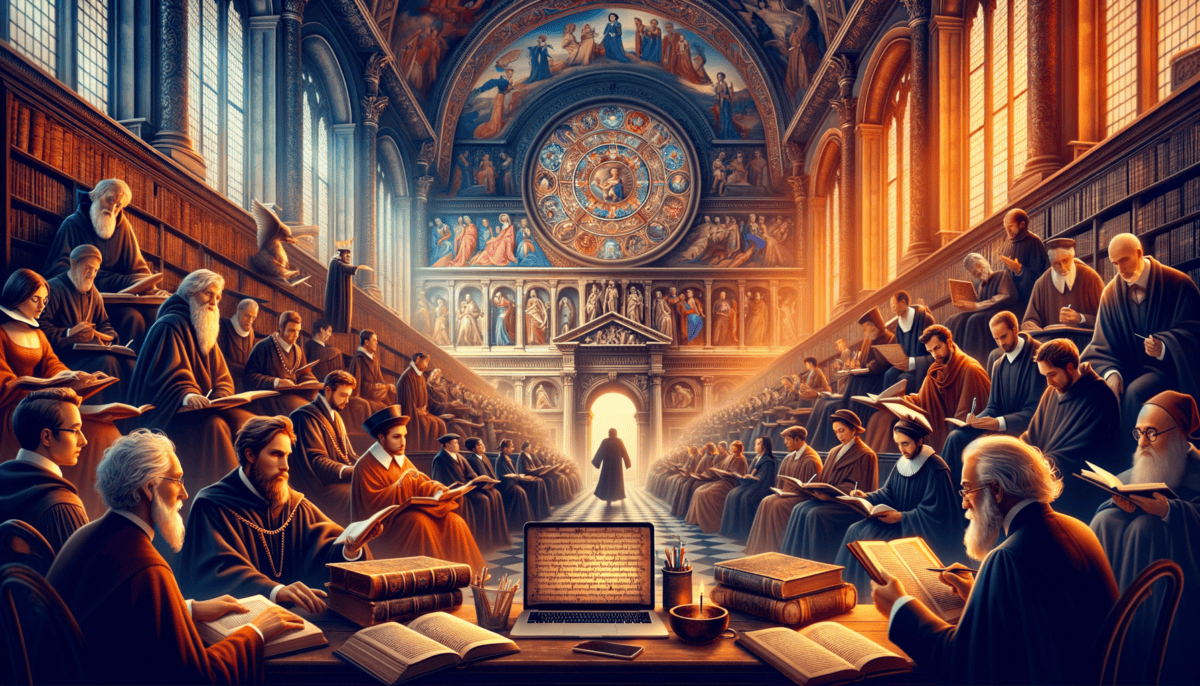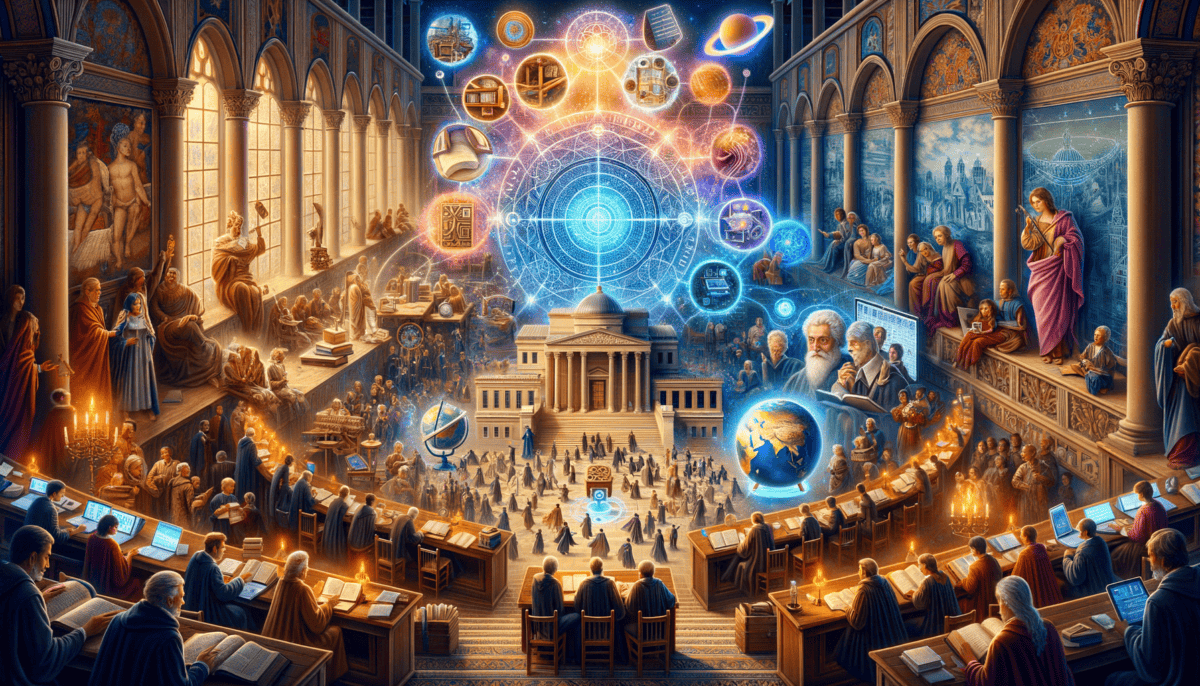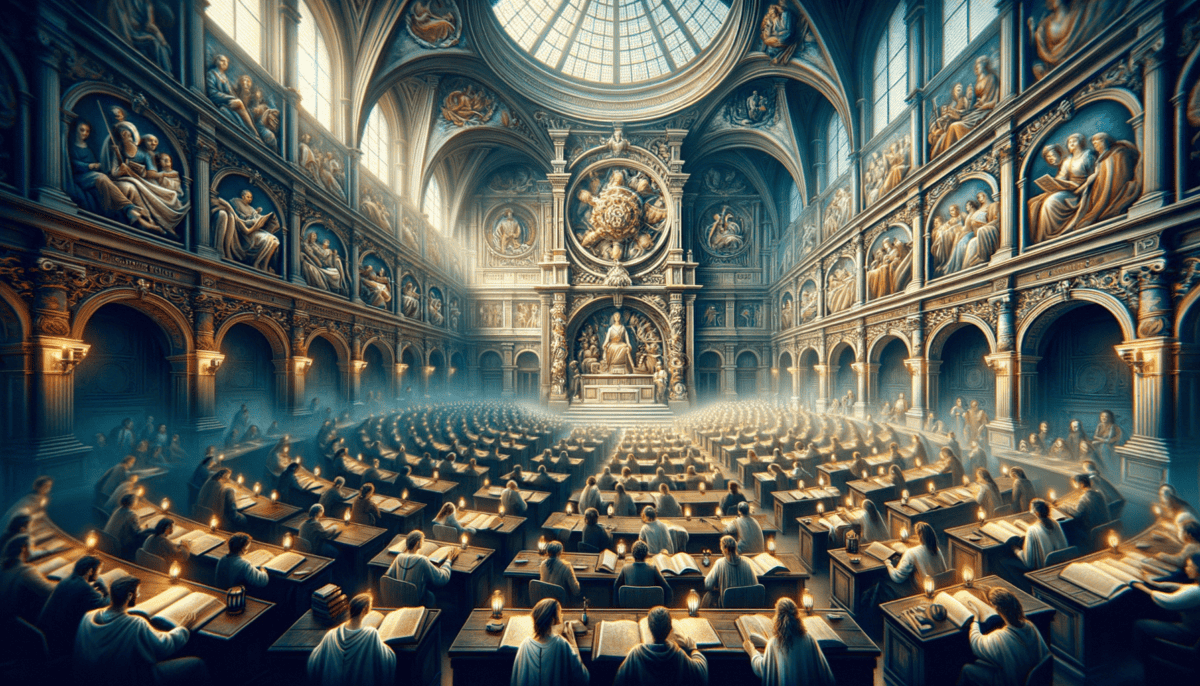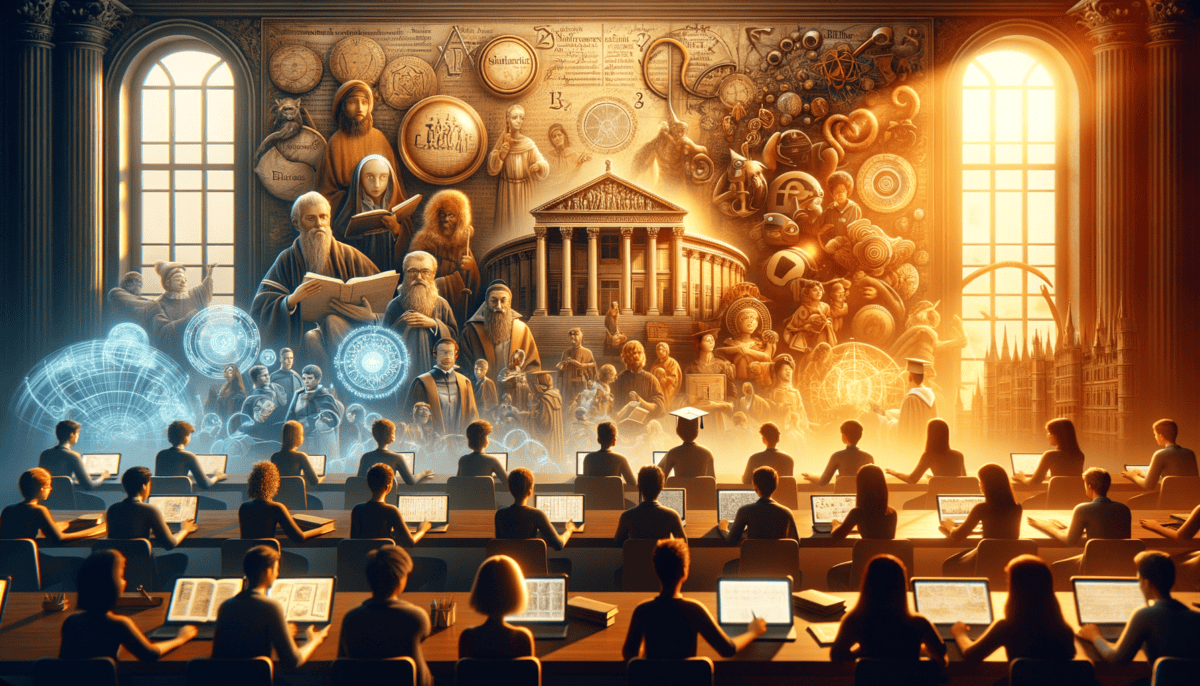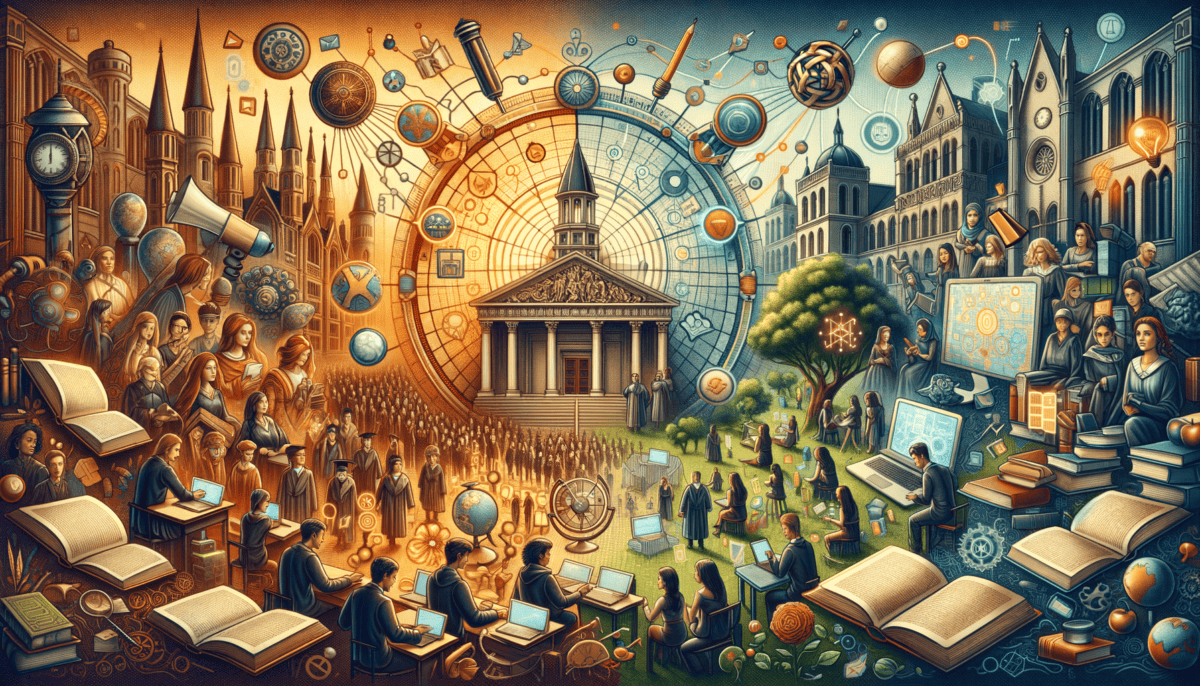A Dream of Learning
The warm Italian sun peeked through narrow stone windows, casting long shadows across the cobblestone streets of Bologna. Little Marco sat on his father's shoulders, watching a group of young men gather in the town square. Their excited voices echoed off the ancient buildings.
"Papa, who are they?" Marco asked, pointing at the crowd.
His father smiled. "Those are students, my boy. They come from all over to learn here in Bologna."
It was the year 1088, and something amazing was happening in this bustling city. Young people were creating something brand new – the very first university in the whole world!
"But Papa, what's a university?" Marco's eyes grew wide with curiosity.
"A university is like a special place where people come together to learn big ideas and share what they know," his father explained. "It's different from any school that's ever existed before."
Marco watched as more students arrived. They carried scrolls and books, speaking different languages from far-away places. Some wore simple clothes, while others had fancy robes. But they all shared the same excited look in their eyes – the look of people ready to discover new things.
Important Note:
The University of Bologna started because students wanted to learn more than they could in regular schools. They hired their own teachers and made their own rules about learning!
The students organized themselves into groups called "guilds." Here's what made their system special:
• Students chose what they wanted to learn
• They picked their own teachers
• They shared books and knowledge
• Everyone helped each other understand hard ideas
• People from different countries studied together
"Look there!" Marco's father pointed to a tall building where students were heading inside. "That's where they study law – rules that help people live together fairly."
Marco noticed something interesting. Some students were teaching others, sharing what they knew. Young men sat in circles, discussing big ideas. Others stood at wooden podiums, practicing speeches.
"When I grow up," Marco declared, "I want to be a student too!"
His father laughed. "Maybe you will be, little one. This is just the beginning. Something wonderful is starting here in Bologna – a new way of learning that will change the world forever."
Years later, Marco's dream would come true. He became one of thousands of students who studied at Bologna. The idea of universities spread across Europe like wildfire. More schools opened in Paris, Oxford, and Cambridge.
The tiny spark that started in Bologna grew into a bright flame of knowledge that still burns today. That flame helps millions of people learn and grow, just like little Marco dreamed of doing on that sunny day in 1088.
Through the narrow streets of Bologna, the excited voices of students still echo. They remind us how a simple idea – people coming together to learn – changed the way we share knowledge forever.
The sun set over Bologna's red-tiled roofs, but the light of learning that started there would never go out. It was just the beginning of an amazing story about how universities would grow and change through the centuries ahead.
The medieval city buzzed with energy and possibility. A revolution in learning had begun, and nothing would ever be quite the same again.
The Light Spreads
The morning bells of Notre Dame Cathedral rang out across Paris. The year was 1215, and the narrow streets were already bustling with scholars hurrying to their classes. Among them was young Thomas, clutching a worn leather bag filled with precious scrolls.
“Hurry up, William!” Thomas called to his friend. “Master Pierre’s lecture on philosophy begins soon!”
The two friends rushed through the winding streets of the Latin Quarter, where students from all over Europe came to study. The air was filled with different languages – French, English, German, and Latin mixed together in excited chatter.
“Knowledge is like a candle,” William said, catching his breath. “When you light someone else’s candle, your own flame doesn’t get smaller – it just makes more light for everyone!”
The University of Paris had grown into something amazing. Unlike Bologna, which focused on law, Paris became famous for these important subjects:
• Philosophy (big questions about life)
• Theology (studying about God)
• Arts (reading, writing, and speaking well)
• Medicine (healing sick people)
Special things about studying in Paris:
Students lived in special houses called colleges. These weren’t just places to sleep – they were like families where students helped each other learn. Teachers lived there too, sharing meals and stories with their students.
“Look!” Thomas pointed to a group of scholars having a debate in the courtyard. “That’s what I love about Paris – you can learn from everyone, not just books!”
Meanwhile, across the English Channel, something exciting was happening in Oxford. A group of English students who left Paris had started their own university in 1096.
“Dear Brother,” wrote Elizabeth to her brother studying in Oxford:
In both Paris and Oxford, students followed a careful plan of study:
Morning: Lectures where teachers read from important books
Afternoon: Debates where students practiced arguing about big ideas
Evening: Group discussions and more reading
But it wasn’t all easy. Thomas and William often stayed up late, reading by candlelight. Sometimes they had barely enough to eat. Yet they kept studying because they believed in the power of learning.
“Did you hear?” William whispered one day. “They’re starting new universities in Cambridge and Salamanca too! The light of knowledge is spreading everywhere!”
He was right. The idea that started in Bologna was growing bigger and stronger. Each new university added something special:
Paris became known for deep thinking about big questions.
Oxford created the college system where students lived and learned together.
Cambridge focused on new ways of studying math and science.
As the sun set over Paris, Thomas watched scholars heading home with their books and scrolls. Some carried new ideas that would change how people thought about the world. Others had questions that would take centuries to answer.
The warm glow from college windows lit up the darkening streets. Inside, students and teachers talked, argued, and wondered about everything from the smallest star to the biggest questions about life.
In college rooms across Europe, thousands of candles flickered in the night. Each one was like the light of knowledge itself – growing brighter as it spread from person to person, city to city, country to country.
Breaking Free
The sweet smell of spring flowers drifted through Florence in 1450. Inside a bustling workshop, Leonardo sat sketching human bodies while his master wasn’t looking.
“Did you hear?” whispered Marco, his fellow apprentice. “The university is letting students study things besides church books now!”
Leonardo’s eyes lit up. This was big news! For hundreds of years, most learning had been about God and the church. But things were changing.
“The old ways are good,” his teacher had said, “but there’s so much more to learn about!”
All across Europe, exciting things were happening in universities:
• Scientists were doing new experiments
• Artists were studying how bodies really worked
• Doctors were learning better ways to help sick people
One day, Leonardo snuck into a university class. The teacher was different from others he’d seen before. Instead of just reading from old books, she had real plants and animals to show the students!
“Look carefully,” she said, holding up a flower. “Nature is our best teacher. We must use our eyes and minds to understand it.”
In Venice, Maria wrote to her cousin about the changes:
The most amazing things are happening! Teachers are talking about stars, plants, and how our bodies work. They say we should look at the world with our own eyes, not just read what others wrote about it.”
New Ways of Learning:
Students didn’t just sit and listen anymore. They:
• Did experiments
• Drew what they saw
• Asked questions about everything
• Traveled to learn new things
Not everyone liked these changes. Some old teachers got very angry.
“This is dangerous!” they shouted. “Students should only learn what we’ve always taught!”
But it was too late to stop the new ideas. More and more students wanted to learn about the real world. They started special groups called “academies” where they could study new things.
One day, Leonardo saw something amazing. A teacher brought a new machine to class – it was called a printing press!
“With this,” the teacher said, “we can make books faster than ever. Everyone can have books to learn from!”
This was huge! Before, books were very rare and expensive. Now, more people could read and learn.
Maria wrote another letter:
As the sun set over Florence, Leonardo looked at his drawings. He had learned so much by looking at real things, not just reading about them. The world felt bigger and more exciting than ever.
In universities across Europe, candles burned late into the night. But now they lit up rooms where students watched stars through telescopes, drew maps of far-away places, and dreamed up new ways to understand everything around them.
The old walls of universities still stood strong, but the minds inside them were breaking free, ready to explore a whole new world of ideas.
A New Dawn of Learning
The year was 1687, and young Thomas stood wide-eyed in front of Cambridge University. The tall stone buildings seemed to touch the clouds.
“Welcome, new students!” called out Professor Newton, his long robes swishing as he walked. “Today, we begin a great adventure in learning!”
Things were different now at universities. You didn’t have to be rich or from a noble family to study anymore. Thomas came from a small village, and his father was a baker.
“Knowledge belongs to everyone,” Professor Newton often said. “The mysteries of our world are waiting to be solved by curious minds.”
In the bright new classroom, Thomas met Sarah, whose eyes sparkled with excitement. Even though most students were boys, some brave girls had started coming to learn too!
Professor Newton showed them something amazing:
The Great Light Experiment
• Used a special glass called a prism
• Showed how white light breaks into colors
• Let students try it themselves
• Wrote down what they saw
Thomas wrote in his diary that night:
Today we made rainbows in class! But we didn’t just watch – we had to figure out WHY it happened. This is so different from my old school where we just memorized things.”
More exciting changes were happening:
New Ways to Learn:
Students built machines
Drew maps of distant lands ️
Studied plants and animals up close
Learned about medicine and healing
One day, Sarah brought big news:
“They’re opening the library to everyone!” she announced. “We can read any book we want!”
The library was magical. Tall shelves reached to the ceiling, filled with books about everything you could imagine.
Professor Newton smiled at their amazement. “Remember,” he said, “question everything. Test your ideas. That’s how we learn what’s true.”
Thomas made friends from different places. Pierre came from France, and Maria from Italy. They all spoke different languages, but they shared the same love for learning.
They started a special club:
Met every Wednesday night
Shared new discoveries
Helped each other learn
Drew pictures of their experiments
One evening, while watching the stars through a telescope, Sarah said something important:
“Look how much we’ve learned already! And think about all the things we still don’t know – isn’t it exciting?”
Thomas nodded. The more they learned, the more questions they had. But that was the fun part!
Near the end of the year, Professor Newton called them together:
“You’ve shown that anyone can be a scholar if they work hard and ask good questions. The future of learning is in your hands.”
Looking around the classroom, Thomas saw something beautiful: students from different places and families, all working together to understand the world better.
As the sun set behind Cambridge’s towers, Thomas knew this was just the beginning. A new way of learning was spreading across Europe, and nothing would ever be the same.
Breaking Down Borders
The grand halls of Oxford University buzzed with excitement in 1867. Mary Bennett clutched her acceptance letter, hardly believing she was one of the first women allowed to study here.
“Welcome to a new era,” announced Professor Elizabeth Anderson. “Today, we open our doors wider than ever before!”
Mary met students from all over the world:
Her New Friends:
• Raj from India, studying mathematics
• Chen from China, researching medicine
• Isabella from Brazil, learning about plants
• Ahmed from Egypt, studying engineering
One day, Isabella showed Mary something amazing in the university greenhouse:
“Look at these plants we brought from the Amazon!” she exclaimed. “We’re learning how they can heal people!”
“Can you imagine?” Mary wrote in her journal that night. “Ideas and discoveries traveling across oceans, making us all smarter together!”
Professor Anderson started a special project:
The students created an international science club. They wrote letters to other universities and shared their discoveries.
Some Big Changes Happening:
More girls coming to study
New subjects being taught
Science labs getting bigger
Libraries sharing books worldwide
One morning, Raj rushed into the common room:
“Look at this!” he shouted, holding up a telegram. “Scientists in Germany just made an amazing discovery about light waves! And they want us to help test it!”
Students shared ideas
Teachers visited other schools ✈️
Books got translated
New tools were invented
Chen taught everyone about Chinese medicine, while Ahmed showed them Egyptian engineering secrets. Mary realized something important:
“When we mix different ways of thinking, we learn so much more!”
Professor Anderson organized the first International Student Conference:
Students from everywhere came to:
Share their research
Make new friends
Learn different languages ️
Plan future projects together
One evening, sitting in the library, Mary looked around at her friends from all over the world. They were different in many ways, but they all loved learning.
“Remember,” Isabella said, “every time we share knowledge, we make the world a little bit smaller and smarter.”
The university was changing fast. New buildings went up, filled with modern equipment. Telegraph wires connected them to other schools around the world. ⚡
As the year ended, Professor Anderson gathered everyone in the great hall:
Standing under the stars that night, Mary smiled. The world was getting bigger and smaller at the same time, and universities were leading the way. Tomorrow would bring new discoveries, new friends, and new ways to learn together.
Digital Dreams and Global Classrooms
The year is 2023, and Sarah Chen sits in her cozy bedroom in Seattle, attending a virtual lecture from Professor Martinez in Barcelona.
“Today, we’re joined by students from 50 different countries!” Professor Martinez beams through the screen. “Who would have thought this was possible when universities first began?”
In her virtual study group, Sarah works with:
Global Study Buddies:
• Aisha from Dubai (AI Research)
• Miguel from Mexico (Climate Science)
• Priya from India (Robotics)
• Leo from Kenya (Medical Technology)
“Remember when universities were just buildings?” Leo laughs during their video chat. “Now the whole world is our classroom!”
Sarah’s favorite part is their virtual reality lab:
Technology makes learning fun and real:
Cool New Learning Tools:
3D printers making models ️
Robots helping in labs
Smart boards that read minds (almost!)
Virtual field trips everywhere
One morning, Priya shares exciting news:
“Our robotics team just created a tiny robot that can clean oceans! And we did it all through online collaboration!”
Classes any time of day ⏰
Learning from anywhere
Meeting friends worldwide
Solving big problems together
They use amazing tools to work together:
“Watch this!” Miguel demonstrates their new climate change simulator. “We can see how our actions today affect tomorrow’s world!”
Sarah loves how universities keep changing and growing:
Universities Today:
Mix online and in-person learning
Use artificial intelligence to help teach
Connect students globally
Solve real-world problems
During their weekly global meetup, Aisha shares something special:
The students work on their biggest project yet – designing tomorrow’s university:
“Imagine classrooms in space!” Leo dreams.
“Or underwater research labs!” adds Miguel.
“Maybe we’ll have thought-sharing technology!” Priya giggles.
As Sarah logs off for the night, she thinks about how far universities have come. From medieval Bologna to virtual reality classes, from exclusive clubs to global communities, universities keep growing and changing.
Looking at her blank screen, Sarah smiles. Tomorrow, she’ll learn something new with friends from around the world. That’s what universities have always been about – bringing curious people together to discover, create, and dream. The adventure of learning never ends; it just keeps getting better. ✨


